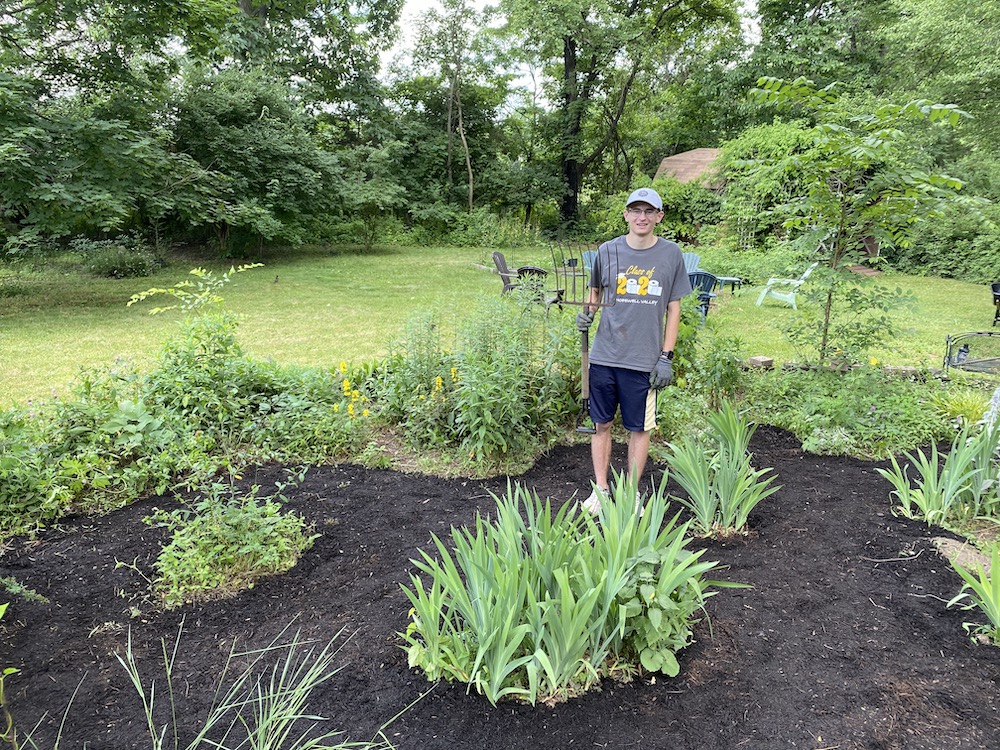In the beginning of the coronavirus pandemic, while volunteering to deliver groceries for vulnerable populations, Will Titus developed an idea to create an organization that provided different services for local residents.
The organization called Hopewell Helpers would connect local residents in need of services and local students with a job.
“After delivering groceries for a couple weeks, I was dropping off groceries at one of the the houses and thought, this is a service that is providing something valuable for people,” Titus said. “It was also giving me a sense of purpose and satisfaction during the pandemic.”
Titus’s idea formed through his time delivering groceries for Hopewell Gives Back and turned into a reality when he created Hopewell Helpers. The Williams College student started working on the idea for Hopewell Helpers in the middle of May and launched the organization in June.
“I thought, what if we take that same idea of taking younger people and matching them with local residents who need different services,” he said. “Originally I thought it would be just grocery shopping and delivery, but it very quickly expanded into all different services, and in fact we have actually done very little in deliveries of groceries.”
Hopewell Helpers provides local residents with various services that include yard work, manual labor, child care, grocery shopping, housework, tech support, pet care and tutoring. The organization serves residents in Mercer, Hunterdon and Bucks counties.
“If somebody needs help with something we can help them with it. No matter what their individual situation is we can offer a level of service that is incredible,” Titus said. “We are students eager to work and to be outside doing the jobs.”
Currently, Hopewell Helpers has close to 30 students participating in the student-created and student-run organization.
“Originally, I just reached out to a couple friends from Hopewell Valley Central High School to join this effort. I asked them if they wanted a job and to make some money and help others. They were on board,” Titus said. “From there I kept asking more of my friends and kept building the team. Eventually it got so big and other folks I did not know were contacting me to join.”
Titus has been surprised by the growth rate of the organization, but not the student interest.
“I was not to surprised for the most part that students would be interested, because in my opinion it is more of a break from the more traditional type of summer job like working in an ice cream store,” he said. “You have more freedom and work with many other students in meaningful work.”
For students to be eligible to participate in Hopewell Helpers they must be a current and rising high school senior with a driver’s license, or a college student. Each student that is accepted can perform many of the services offered by Hopewell Helpers, Titus said.
“There are a couple of people for more specialized jobs. We don’t get super specialized jobs, but jobs that need a little more handiness. There are people we have who do have experience in construction or are just really handy individuals,” he said. “I try to make sure they are there for those jobs to give guidance to those also a part of that specialized job. We have several people who has focus a lot on the babysitting or tutoring jobs, but for the most part everybody has the opportunity to do everything.”
Hopewell Helpers has a pay-what-you-want model when it comes to jobs offered or not listed but are accepted. By adopting this model, it allows for people to pay a little more for a job and what they can. If a person cannot pay anything, Hopewell Helpers can still do the job being requested, according to the organization.
“It gives us a wider base of potential clients than we would have if we set prices. Part of it is that I do not have the experience to accurately set a price for everything that we do and we do such a wide variety of things it would be difficult and time consuming to do that,” Titus said. “That way we don’t alienate people based solely off price.”
Through this model, each student helper will keep 70% of what they make and 30% goes back to the organization. The 30% goes to compensating individuals doing backend work on the organization and towards a pot. Since some jobs won’t pay as much, money will be taken out of the pot to raise each student to a certain level of pay to make sure they are making at least a set amount at a minimum.
A decision on whether Hopewell Helpers will continue through end of the year is still up in the air, as Titus prepares for a return in the fall to Williams College in Massachusetts.
“I would still like to be able to get more students who are taking gap years for college or high school students who are old enough to join our team. If I am able to do that and get some folks who are able to run the backend stuff while I’m at college in the fall, I can then see Hopewell Helpers continuing into next year,” Titus said. “If it does not continue into the fall, then this is something I would like to bring back in the spring and summer as seasonal type of thing.”
For more information on Hopewell Helpers, visit www.hopewellhelpers.com.

